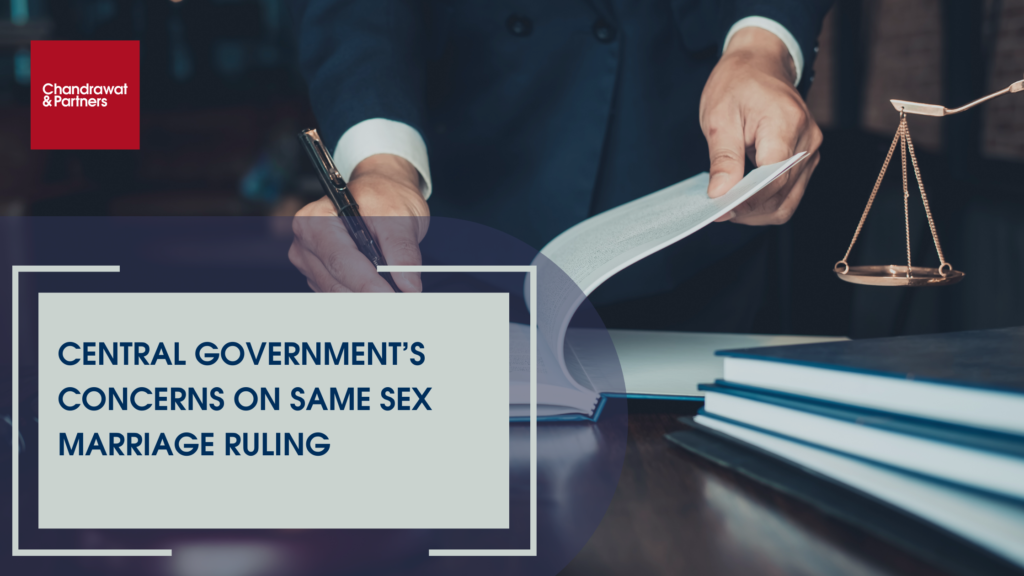Home > Recent judgements >Central Government’s Concerns Post Supreme Court’s Same Sex Marriage Ruling
Date: 19 April, 2024

Share :
CASE BRIEF
The Supreme Court of India unanimously held that there was no unqualified fundamental right to marry under the Constitution. The Court also upheld the constitutional validity of Section 4 of the Special Marriage Act, 1954 and Section 4 of the Foreign Marriage Act, 1969 that only recognises marriages between heterosexual couples. The case stemmed from various petitions filed across Indian High Courts seeking legal recognition of LGBTQIA+ couples’ right to marry. The Court took cognizance of nine similar petitions before Delhi and Kerala High Court and transferred the petitions to itself. In March 2023, the Court referred these petitions to a constitutional bench for judicial review. The matter was then referred to a Five-Judge Bench considering the importance of the issue.
BACKGROUND
In Navtej Singh Johar and Others vs. Union of India (AIR 2018 SC 4321), the Supreme Court ruled that Section 377 was unconstitutional in the context of consensual relationships between LGBTQIA+ people. The Court acknowledged that Section 377 violated Articles 14, 15, and 19 of the Constitution by discriminating based on sexual orientation and limiting sexual privacy. Several petitions have now recognized a comprehensive set of constitutional rights that must be extended to the queer population. This included the freedom to choose your own partner, as well as the right to sexual privacy and dignity.
Following the case, several petitioners filed motions in several High Courts around the country seeking the right to marry for LGBTQIA+ couples. The petitions stated that failing to recognize these marriages was discriminatory and violated their constitutional rights. The petitioners contended that recognizing the right to marry will enable the LGBTQIA+ community to exercise their rights to free speech and expression, privacy, autonomy, and dignity. Other petitioners sought equal recognition in order to achieve social sanctity and enjoy the express and inferred benefits of legally recognized marriage under the Special Marriage Act. 1954 and Foreign Marriage Act, 1969. Overall, petitioners claimed that the legal system discriminates against the LGBTQIA+ population by denying them the right to marry, which is a civic institution available to heterosexual couples.
KEY ISSUE
The primary issue in this case related to the recognition of “right to marry” as a fundamental right which should extend to couples in non-heterosexual relationships. The Court took suo moto cognizance of the cases, recognising the violence and discrimination faced by LGBTQIA+ community in India. The Court admitted twenty connected petitions filed in different High Courts by fifty-two individuals, including seventeen LGBTQIA+ couples. While admitting the case, the Court recognised that despite decriminalisation of LGBTQIA+ sexual relationships, individuals still faced discrimination and violence. Owing to the importance of the case, it was heard by a Five-Judge Constitution bench of the Court.
SUPREME COURT’S DECISION
A Five-Judge bench of the Court unanimously held that the right to marriage was not a fundamental right, and relied on the distinction between the right to choose a partner and the right to marry. The Court relied upon its earlier jurisprudence to repeat that while the right to choose a partner was a fundamental right, only the State could make a law to allow queer couples to marry. The bench as a whole discussed queer couples’ right to enter into a union, but the majority bench held that there was no obligation on the State to legally recognise such civil unions.
In a 3:2 verdict, the Court held that a joint reading of Articles 19, 21 and 25 did not confer a positive obligation on the State to recognise civil unions comparable to marriage. The majority bench reaffirmed the right to choose, cohabit and enjoy physical intimacy but did not place an obligation upon the State to recognise LGBTQIA+ unions and democratise private spaces. The dissenting opinion argued that the State has a positive obligation to democratise the private sphere and override the right to privacy in certain cases to curtail discrimination against queer individuals.
CENTRAL GOVERNMENT COMMITTEE
The Central Government has constituted a six-member committee to examine various issues relating to the queer community as directed by the Supreme Court in its judgement in Supriyo v. Union of India. The Committee may examine and submit recommendations on the following issues:
- The Central and State Governments may take efforts to prevent discrimination against the LGBTQIA+ community in accessing products and services.
- It is suggested by the committee that the efforts should be taken to protect the queer community against assault, harassment, and coercion.
- Measures to be implemented to prevent involuntary medical treatments and procedures for gay individuals, including mental health modules.
- Measures to be taken to ensure that there is no discrimination in access to social welfare entitlements to queer persons.
SUMMARY
The judgment authored by Chief Justice of India DY Chandrachud stated that the Committee shall include experts with domain knowledge and experience in dealing with the social, psychological, and emotional needs of persons belonging to the queer community as well as members of the queer community. CJI Chandrachud observed in his judgment that the Committee shall in terms of the exposition in this judgment consider the following:
- Enabling partners in a queer relationship;
- Jail visitation rights and the right to access the body of the deceased partner and arrange the last rites; and
- Legal consequences such as succession rights, maintenance, financial benefits such as under the Income Tax Act 1961, rights flowing from employment such as gratuity and family pension and insurance.
The report of the Committee chaired by the Cabinet Secretary shall be implemented at the administrative level by the Union Government and the governments of the States and Union Territories, the judgment stated.
For more information or queries, please email us at
[email protected]




